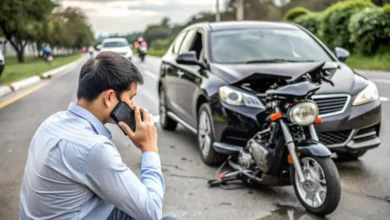Auto Insurance in the United States A Complete Guide for Immigrants and Residents
Learn all about auto insurance in the U.S.: coverage types, legal requirements, and essential tips for immigrants and residents.

Auto Insurance in the United States A Complete Guide for Immigrants and Residents. Auto insurance is a critical component of vehicle ownership in the United States.
Not only is it a legal requirement in nearly all states, but it also protects drivers, passengers, and vehicles from the financial burden of accidents, theft, or damage.
This article will explain in detail how to acquire auto insurance in the U.S., with specific guidance for both immigrants and native residents.
We’ll also explore the various types of auto insurance coverage offered by reputable companies, discuss legal requirements, and answer common questions in a comprehensive FAQ.
Why Auto Insurance is Mandatory in the United States
Auto insurance is required by law in most U.S. states. The primary purpose is to ensure that drivers can cover the costs associated with accidents, including property damage, medical bills, and legal fees.
Failure to maintain adequate insurance coverage can result in penalties, fines, license suspension, and even jail time in some states.
The Importance of Auto Insurance
- Financial Protection: Covers repair costs and medical bills after an accident.
- Legal Requirement: Most states mandate at least liability coverage.
- Peace of Mind: Knowing you’re protected from unexpected expenses.
Types of Auto Insurance Coverage
Understanding the different types of auto insurance is essential for selecting the right plan. U.S. insurance companies offer a variety of coverage options, ranging from basic liability to comprehensive packages that protect against a wide range of risks.
Liability Coverage
Liability insurance is the minimum required by law in most states. It covers:
- Bodily Injury Liability: Medical expenses for injuries you cause to others in an accident.
- Property Damage Liability: Repairs for damage you cause to another person’s vehicle or property.
Collision Coverage
This coverage pays for damage to your car resulting from a collision with another vehicle or object, regardless of fault. It’s essential for those who want to protect their own vehicle in the event of an accident.
Comprehensive Coverage
Comprehensive coverage goes beyond accidents. It protects against:
- Theft
- Vandalism
- Natural disasters
- Falling objects (e.g., tree branches)
- Fire damage
Uninsured/Underinsured Motorist Coverage
This type of insurance covers you if you’re in an accident caused by a driver who has little or no insurance.
Personal Injury Protection (PIP)
PIP is required in some states and covers medical expenses for you and your passengers, regardless of fault.
Third-Party Liability Insurance
Third-party liability insurance covers the costs associated with injuries or damages you cause to other people or their property. It does not cover your own vehicle or injuries but is often required by law.
| Coverage Type | Description |
| Liability | Covers damages and injuries you cause to others. |
| Collision | Covers damage to your own vehicle after a collision. |
| Comprehensive | Protects against theft, vandalism, and natural disasters. |
| Uninsured/Underinsured Motorist | Covers damages caused by drivers with insufficient insurance. |
| Personal Injury Protection (PIP) | Covers medical expenses for you and passengers. |
| Third-Party Liability | Covers damages or injuries caused to others. |
Acquiring Auto Insurance in the U.S.
Both immigrants and native residents can purchase auto insurance in the United States, but the process and required documentation may vary slightly depending on one’s status.
How Immigrants Can Acquire Auto Insurance
Immigrants in the U.S., whether documented or undocumented, can still acquire auto insurance. Here’s a step-by-step guide:
- Driver’s License: Immigrants need a valid driver’s license to obtain insurance. Some states, like California and New York, offer licenses to undocumented immigrants. Others require a U.S. visa or other documentation.
- Vehicle Registration: Immigrants must register their vehicle with the local Department of Motor Vehicles (DMV) before obtaining insurance. Proof of ownership and residence may be required.
- Documents Required:
- Passport or U.S. visa
- Proof of residence (utility bill, lease agreement)
- Social Security Number (optional, but helps with obtaining lower rates)
- International Driving Permit (IDP) if applicable
- Insurance Quotes: Once documents are in order, immigrants can shop for insurance. Companies like State Farm, GEICO, and Allstate offer competitive rates and coverage options for immigrants.
How Native Residents Can Acquire Auto Insurance
For native U.S. residents, the process of acquiring auto insurance is straightforward:
- Driver’s License: A valid state-issued driver’s license is required.
- Vehicle Registration: Ensure your vehicle is registered in your name with the DMV.
- Documents Required:
- Proof of identity (driver’s license)
- Proof of vehicle ownership (registration, title)
- Proof of residence (utility bill, lease)
- Insurance Selection: Residents can compare quotes from major insurers like Progressive, Liberty Mutual, and Nationwide to find the best coverage.
Top Auto Insurance Companies in the U.S.
The following are some of the most trusted auto insurance companies in the U.S. based on customer reviews, claim processing speed, and overall reliability.
State Farm
- Strengths: Offers personalized service and an extensive network of agents.
- Coverage: Includes liability, collision, comprehensive, and PIP options.
- Discounts: Safe driver, multi-policy, and good student discounts.
GEICO
- Strengths: Known for affordable rates and a user-friendly mobile app.
- Coverage: Includes all standard options and rideshare insurance.
- Discounts: Military, federal employee, and multi-vehicle discounts.
Allstate
- Strengths: Excellent customer service and a variety of coverage options.
- Coverage: Offers accident forgiveness and a range of add-ons like roadside assistance.
- Discounts: Drivewise program, multi-policy, and new car discounts.
Progressive
- Strengths: Competitive rates for high-risk drivers.
- Coverage: Includes standard and specialty coverages like gap insurance.
- Discounts: Snapshot program, multi-car, and homeowner discounts.
| Company | Notable Features | Discounts |
| State Farm | Personalized service, wide agent network | Safe driver, good student |
| GEICO | Affordable rates, user-friendly app | Military, federal employee |
| Allstate | Great customer service, accident forgiveness | Drivewise, multi-policy |
| Progressive | Competitive for high-risk drivers, gap insurance | Snapshot, multi-car |
Legal Requirements for Auto Insurance in the U.S.
While the specific laws vary by state, most U.S. states require drivers to carry at least a minimum level of liability insurance. Some states also mandate additional coverage, such as Personal Injury Protection (PIP) or uninsured motorist coverage.
State-by-State Insurance Requirements
- California: Requires minimum liability coverage of $15,000 per person for bodily injury, $30,000 per accident, and $5,000 for property damage.
- New York: Requires a minimum of $25,000 per person for bodily injury and $50,000 per accident.
- Florida: Only requires Personal Injury Protection (PIP) and property damage liability.
| State | Minimum Coverage Requirements |
| California | $15,000 bodily injury per person, $30,000 per accident |
| New York | $25,000 bodily injury per person, $50,000 per accident |
| Florida | Personal Injury Protection (PIP) and property damage |
FAQs About Auto Insurance in the U.S.
1. Is auto insurance mandatory in all U.S. states?
Answer: Yes, except for New Hampshire and Virginia. However, even in these states, drivers must prove they can cover the costs of an accident if it occurs.
2. Can immigrants get car insurance in the U.S.?
Answer: Yes, immigrants, including those without legal status, can obtain auto insurance in most states if they have a valid driver’s license and can register their vehicle.
3. What documents do I need to get auto insurance?
Answer: For most policies, you need a driver’s license, proof of vehicle ownership, and proof of residence. Immigrants may need additional identification like a passport or visa.
4. What is third-party liability insurance?
Answer: This insurance covers the costs of damages or injuries you cause to others in an accident. It does not cover your own expenses.
5. Does my personal auto insurance cover rental cars?
Answer: In most cases, yes. Many auto insurance policies extend to rental vehicles, but it’s important to check your specific policy or purchase additional coverage through the rental company.
6. What happens if I drive without insurance?
Answer: Driving without insurance is illegal in most states and can result in fines, license suspension, and even imprisonment.
Conclusion
Auto insurance in the U.S. is a necessity for both financial protection and legal compliance. Whether you’re an immigrant or a native resident, securing the right insurance coverage can help you drive with confidence.
By understanding the various types of coverage available, selecting a reputable insurance company, and adhering to state laws, you can ensure that you’re fully protected on the road.
Make sure to review your coverage needs carefully, compare rates, and consult with a trusted insurance agent to find the best policy for your situation.





